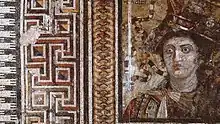
The Graeco-Roman Museum is an archaeological museum located in Alexandria, Egypt.
History
Erected in 1892, it was first built in a five-room apartment, inside one small building on Rosetta Street (later Avenue Canope and now Horriya). In 1895, it was transferred to another, larger building near Gamal Abdul Nasser Street. Its first director was Giuseppe Botti. From 1904 to 1932 he was followed by Evaristo Breccia and then Achille Adriani.[1][2] The museum was inaugurated in 1895 by Khedive Abbas II.[2] The museum edited the Bulletin of the Alexandria Archaeological Society.[2]
The museum contains several pieces dating from the Greco-Roman (Ptolemaic) era in the 3rd century BC, such as a sculpture of Apis in black granite, the sacred bull of the Egyptians, mummies, sarcophagus, tapestries, and other objects offering a view of Greco-Roman civilization in contact with ancient Egypt.
The museum's collection is the product of donations from wealthy Alexandrians as well as of excavations led by successive directors of the institution, both within the town and in its environs. Certain other objects have come from the Organization of Antiquities at Cairo (particularly those of the Pharaonic period) and from various digs undertaken at the beginning of the century in Fayoum and at Benhasa. Housed within a historic building whose beautiful neoclassical facade of six columns and pediment bears the large Greek inscription ‘MOYΣEION’ ("MOUSEION"). The museum consists of 27 halls and an attractive garden,[3] which offer an excellent introduction to Egypt's Greco-Roman period.
The museum was closed for renovations in 2005.[4] In February 2022 the Secretary-General of the Supreme Council of Antiquities, Mostafa Waziri, said that the museum would be opened within a few months.[5] On 11 October 2023, Egyptian Prime Minister Mostafa Madbouly attended the reopening of the museum, following 18 years of renovations.[6]
Directors of the Greco-Roman Museum
- 1892–1903, Giuseppe Botti
- 1904–1932, Evaristo Breccia
- Achille Adriani
- 2004–2010, Mervat Seif el-Din
Gallery
 Floor plan
Floor plan Sophilos Mosaic
Sophilos Mosaic Osiris-Antinous in marble 2nd century CE
Osiris-Antinous in marble 2nd century CE Figurines
Figurines.jpg.webp) Cleopatra
Cleopatra Carved bone plaques
Carved bone plaques
See also
References
- ↑ Chiti, Elena (28 February 2018). "Conflicting Histories of Alexandria, or Alexandrians with No Museum (1892-2016)". Egypte/monde arabe (17): 71. doi:10.4000/EMA.3840. ISSN 1110-5097. Wikidata Q112631377.
- 1 2 3 Reid, Donald M. (1996). "Cromer and the Classics: Imperialism, Nationalism and the Greco-Roman Past in Modern Egypt". Middle Eastern Studies. 32 (1): 1–29. ISSN 0026-3206.
- ↑ "StackPath".
- ↑ El-Aref, Nevine (30 October 2013). "Alexandria's Graeco-Roman Museum to reopen within 18 months". Retrieved 4 August 2016.
- ↑ "StackPath".
- ↑ "Egypt reopens Graeco-Roman museum in Alexandria after renovations". Xinhua. 11 October 2023.
External links
https://commons.wikimedia.org/wiki/Category:Greco-Roman_Museum,_Alexandria 31°11′57″N 29°54′25″E / 31.199259°N 29.906872°E